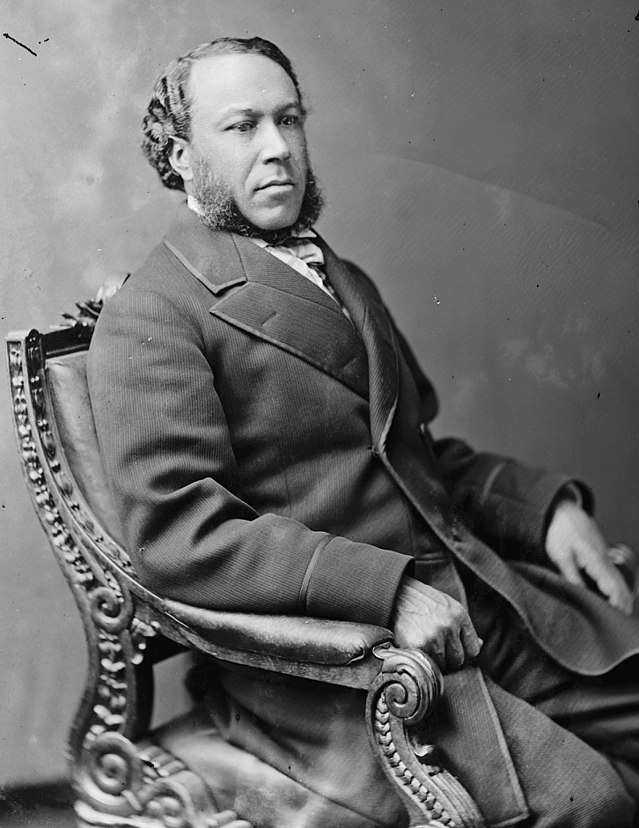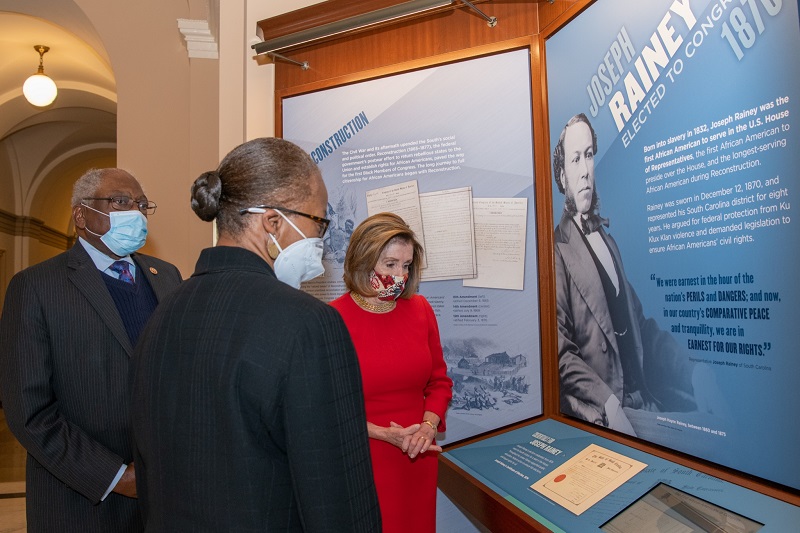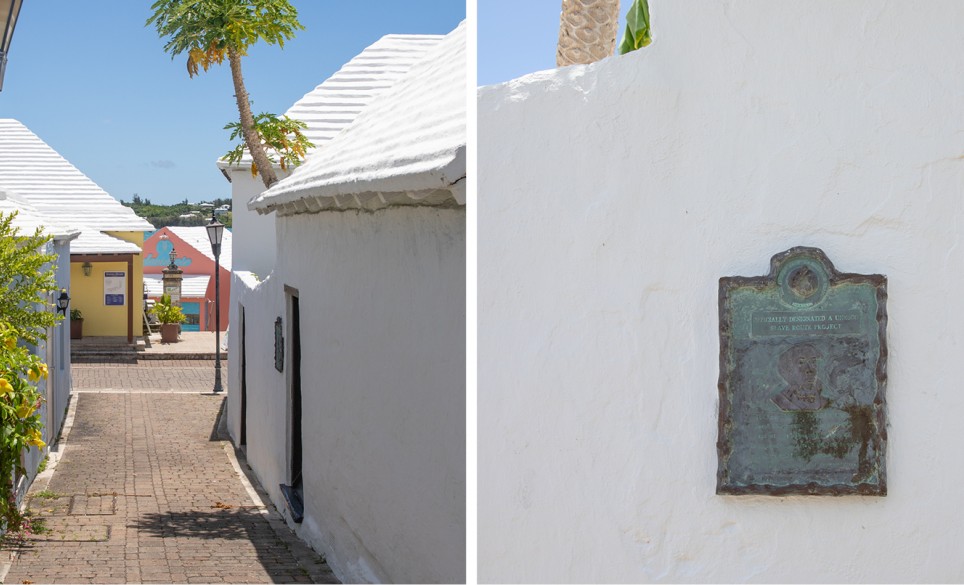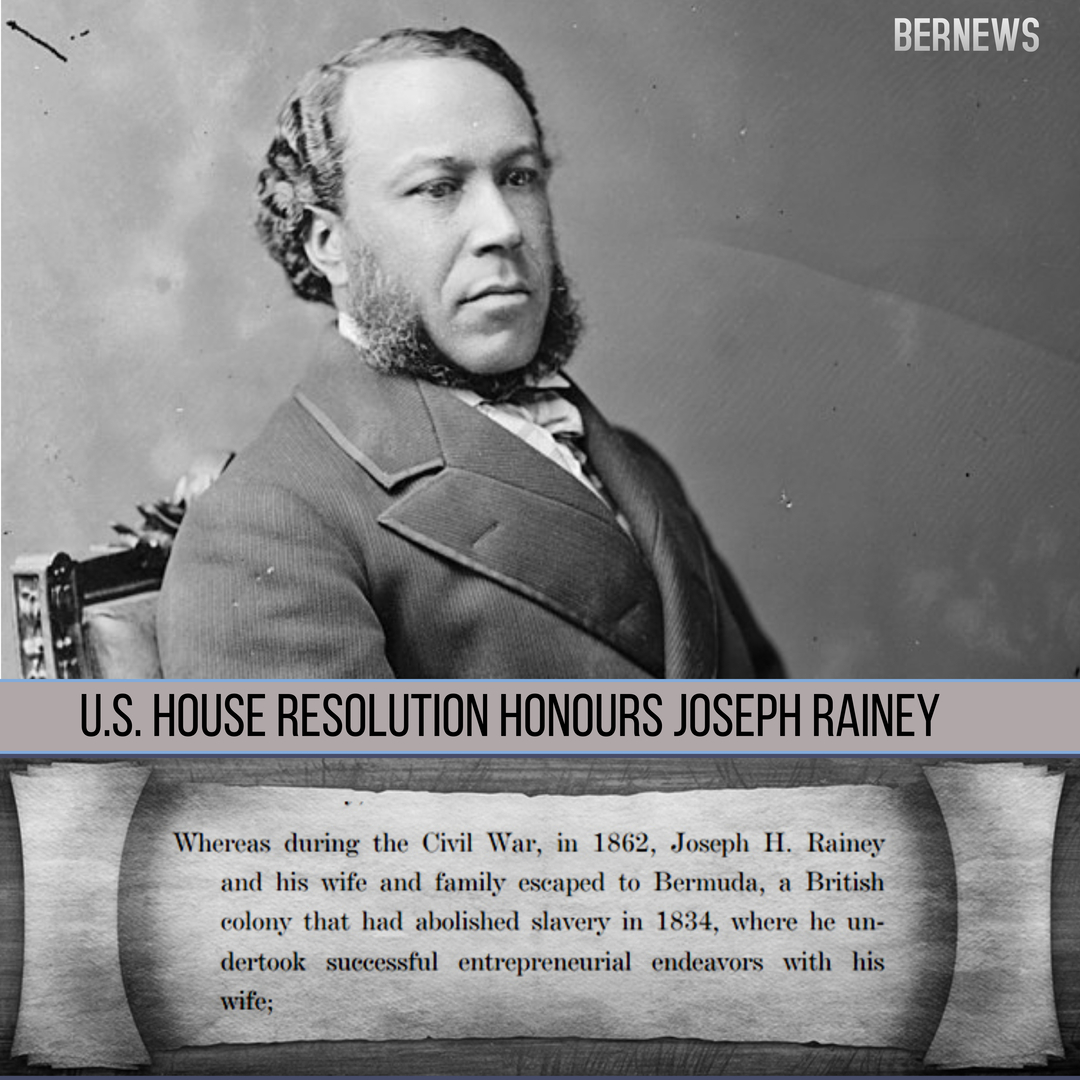U.S. House Resolution Honours Joseph Rainey
The U.S. House of Representatives passed a Resolution to designate a room in the United States Capitol as ‘the Joseph H. Rainey Room’, serving to honour the historic life of the one time Bermuda resident who went on to become the first Black man to serve in the House of Representatives.
The Resolution noted that Rep. Rainey “was born enslaved” in 1832 in South Carolina, and during the Civil War in 1862 [when slavery had been abolished in Bermuda, but not yet in the U.S] he and family “escaped to Bermuda” where “he undertook successful entrepreneurial endeavors,” and later moved back to the U.S. in 1866.
Photo courtesy of the U.S. Library of Congress:
This comes as the U.S Congress celebrates the 150th anniversary of Rep Rainey’s swearing-in — which was on December 12th, 1870 — hosting an exhibition in the United States Capitol celebrating the important anniversary.
“150 years ago, Joseph Rainey became the first African American to be sworn into the House of Representatives.” U.S. Speaker Nancy Pelosi tweeted. “I had the opportunity to visit this special exhibit with Whip James Clyburn & Clerk Johnson, which will share his story & inspire so many in the fight for justice.”
Photo via Speaker Nancy Pelosi’s Twitter:
His profile on the official U.S. House website notes that while in Bermuda “the Raineys lived in the towns of St. George’s and Hamilton where Joseph set up a successful barbershop and Susan Rainey opened a dress store.”
Extract of the official Resolution that mentions Bermuda
According to the Bermuda National Trust, Joseph Rainey “operated a barber shop in or near the kitchen at Tucker House from 1862-1865. Rainey and his wife arrived in Bermuda during 1862, after escaping the South due to the American Civil War,” with the BNT also noting that Barber’s Alley in St George’s is named for Rep Rainey.
“Barber’s Alley is an iconic stop on our African Diaspora Heritage Trail,” the BTA has said, and their website says: “The Tucker House, built in the late 1700s in the historic Town of St. George, is filled with stories from Bermuda’s past.
“But one of the most fascinating is that of Joseph Hayne Rainey, who was formerly enslaved in the American South and at age 14 his father not only bought his freedom but also taught him the barber’s trade. In 1862, during the Civil War, Rainey and his wife Susan escaped the South and sailed to Bermuda. Rainey opened a barbershop in the kitchen of the Tucker House – and indeed, that’s how Barber’s Alley got its name. ”
Photo courtesy of the BTA:
“During his time in the House, Rainey made history fighting for other African-Americans. Despite threats of violence, Rainey backed the KKK Act, which gave the federal government better ability to push back against the Ku Klux Klan and other hate groups,” CNN reported, while the official U.S website notes he got “death threats” from the KKK.
Rep. Rainey represented South Carolina in the U.S Congress, and this Bill was sponsored by South Carolina Representative James Clyburn, who is currently the highest-ranking Black lawmaker in the U.S. Congress, and according to the GovTrack website, it passed on December 10th.
Video via Rep Clyburn’s Twitter account, where he talks about celebrating the 150th anniversary of his swearing in, and also mentions how Rep Rainey once lived in Bermuda
The Resolution [PDF] states:
“Designating room H–150 of the United States Capitol as The Joseph H. Rainey Room to honor the historic life, career, and legacy of Representative Joseph Rainey of South Carolina on the 150th anniversary of his seating as a member of the House of Representatives.
“Whereas Joseph Hayne Rainey was born enslaved on June 21, 1832, in Georgetown, South Carolina;
“Whereas South Carolina prohibited the education of Black Americans, and instead of a formal education, Joseph H. Rainey learned the barbering trade from his father, Edward Rainey;
“Whereas Edward Rainey used profits from his work as a barber to buy his and his family’s freedom in the early 1840’s;
“Whereas Joseph H. Rainey eventually moved with his family to Charleston, South Carolina;
“Whereas in 1859, Joseph H. Rainey married his wife, Susan, with whom he had three children, Joseph, Herbert, and Olive;
“Whereas in 1861, Joseph H. Rainey was conscripted by the Confederate Army and worked as a ship’s steward aboard a Confederate vessel which secretly carried goods to the Union Navy;
“Whereas during the Civil War, in 1862, Joseph H. Rainey and his wife and family escaped to Bermuda, a British colony that had abolished slavery in 1834, where he undertook successful entrepreneurial endeavors with his wife;
“Whereas in 1866 Joseph Rainey and his family moved back to Charleston, South Carolina after the Civil War had ended;
“Whereas Joseph H. Rainey co-founded the State Republican Party and represented Georgetown, South Carolina, on the Party’s central committee;
“Whereas Joseph H. Rainey participated in the South Carolina State constitutional convention in 1868;
“Whereas Joseph H. Rainey won election to the House of Representatives in 1870 and was the first African American to serve in the House of Representatives;
“Whereas Joseph H. Rainey was sworn in as a member of the House of Representatives on December 12, 1870, to represent the 1st District of South Carolina in the Forty-First Congress;
“Whereas Joseph H. Rainey became the first African American to preside over the House of Representatives on April 29, 1874;
“Whereas Joseph H. Rainey served with distinction on several committees, including the Committee on Freedmen’s Affairs, the committee handling all legislation concerning formerly enslaved people;
“Whereas Joseph H. Rainey implored Congress to provide more resources for education, calling for a Federal, publicly funded school system to develop the “future lawmakers and rulers of our country”;
“Whereas Joseph H. Rainey spoke on the House floor in support of a $1 million appropriation to protect voting rights in the South, which was later approved;
“Whereas Joseph H. Rainey called for decisive Federal action to end widespread violence in the former Confederacy, advocating for passage of the Ku Klux Klan Act of 1871;
“Whereas Joseph H. Rainey spoke extensively on the floor of the House of Representatives about discrimination he faced as a sitting Member of Congress, advocating for a civil rights act to end discrimination on juries, in schools, on transportation, and in public accommodations;
“Whereas Joseph H. Rainey departed the House of Representatives on March 3, 1879, following electoral backlash against Reconstruction;
“Whereas Joseph H. Rainey was the longest-serving African-American Member of Congress during the Reconstruction period;
“Whereas Joseph H. Rainey was appointed a special agent of the United States Department of the Treasury in South Carolina in 1879 following his Congressional service;
“Whereas Joseph H. Rainey is now commemorated in the United States Capitol in an exhibit unveiled on December 4, 2020, by the Speaker of the House, highlighting his legacy and the foundation he laid for generations of lawmakers; and
“Whereas the Historian and the Clerk of the House of Representatives published a historical record in September 2020 entitled We Are in Earnest for Our Rights: Rainey and the Struggle for Reconstruction, chronicling the legacy of Representative Joseph Rainey: Now, therefore, be it
“That room H–150 of the United States Capitol is designated as “The Joseph H. Rainey Room” to honor the historic life, career, and legacy of Representative Joseph Rainey of South Carolina on the 150th anniversary of his seating as a member of the House of Representatives.”







I had no idea of this man or his connection to Bermuda. Very cool!
Hope he had a work permit!
Seriously speaking, this is a great and remarkable story fully deserving of this recognition.
I wonder if the story of this man and others can be introduced to students in our public schools. Maybe they will appreciate the opportunities they have, instead of giving up so easily.